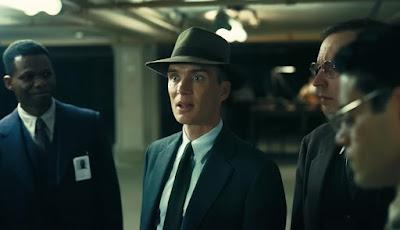Format: DVD from Cortland Public Library on basement television.

I don’t think anyone was surprised when Oppenheimer cleaned up at the most recent Oscars ceremony. I hadn’t seen the film until today and I would have picked it to win more than the seven it did. Christopher Nolan was due to win an Oscar, as the best working director without one in the minds of many people (although I’d pick either David Fincher or Greta Gerwig). But it was Nolan’s year and nothing was going to knock this movie and Nolan off of that pedestal. It’s been one that I’ve been looking to watch for some time, but the last few months have been disturbingly busy, and this film is a good three hours long. As it is, it took me a couple of days to watch it.
This, of course, is the story of J. Robert Oppenheimer (Cillian Murphy), the man most credited with the creation of the first atomic bomb and the Manhattan Project. As befits a movie that is a good three hours long, Oppenheimer turns out to be a lot more complicated than we might think. The film has the good taste not to be hagiographic, although I wouldn’t call this a “warts and all” biography, either. Oppenheimer is painted as at least a sympathizer of communist sympathizers (his brother, his wife), as well as a womanizer. So, we’re going to be led to seeing him as brilliant, but flawed, which is probably the best we can expect.
Naturally, a good part of the film concerns the Manhattan Project and the building of the first atomic weapons, but we’re not going to get there directly. Instead, this is going to be viewed through a pair of lenses. The first concerns a hearing about Oppenheimer’s security clearance in the years after the war, when he was no longer politically or scientifically useful and his previous communist leanings, as well as those of his brother (Dylan Arnold) and his wife Kitty (Emily Blunt). The other lens is the cabinet confirmation hearings of Lewis Strauss (Robert Downey Jr.), a major military player in the early days of atomic weaponry and energy. In fact, it becomes apparent that Oppenheimer’s meteoric fall was engineered in large part by Strauss over a series of perceived slights at the hands of Oppenheimer, including his belief that Oppenheimer caused Albert Einstein to snub him.
The film, of course, is stylish, and Nolan manages some legitimate tension in scenes where the outcome is already known. For instance, the main bomb test genuinely plays with a great deal of tension, as if the outcome isn’t one that the audience would already know. I knew how this was going to play out, and yet the countdown to the actual explosion is interminable. There are moments at the end, when Oppenheimer is being attacked by the tribunal determining his clearance status that again are truly distressing, and this is true even knowing the eventual outcome from knowing the history. It’s not easy to do that—it takes work and effort to add tension to a scene where at least some of the audience will be aware of the historical results.
One of the obvious benefits to being a director of Christopher Nolan’s stature is that you can pretty much get anyone you want for any role, even for some fairly small ones. Oppenheimer has one of those “cast of thousands” casts where even a number of the smaller roles are filled by well-known and recognizable actors. The cast is honestly too big to go through; we’d be here for another 1000 words just listing off the people. Suffice it to say that Nolan has the sort of credibility and pulling power in Hollywood that he can get an Oscar winner (Rami Malek in this case) to show up at the end of the movie and deliver about a half dozen lines.
But how is it? It’s good, but it would almost have to be, wouldn’t it? Oppenheimer is a grand production that gives us the world from J. Robert Oppenheimer’s perspective, at least in parts. While not rife with fantasy sequences, there are moments where we see Oppenheimer in the real world and then see him in a more metaphorical world, and there are moments of this that seem to push the limits. The most controversial scene, though, is where he reads the Bhagavad Gita while having sex with his mistress (played by Florence Pugh).
I don’t know that I can really say that I “enjoyed” Oppenheimer, because it’s not really that kind of movie. It is lavishly and beautifully made and acted within an inch of the script’s life. There is a sense, though, that Nolan’s win, the movie’s win, and to some extent the wins for Cillian Murphy and Robert Downey Jr. were expected, so even if it turned out not to be a good film, we’d have to call it a great one. So far, it’s probably the most important film from 2023 that I’ve seen, but from a pure enjoyment standpoint, I enjoyed watching The Holdovers and Barbie a lot more.
Why to watch Oppenheimer: It is the culmination of Christopher Nolan’s directorial career.
Why not to watch: It feels inevitable.
